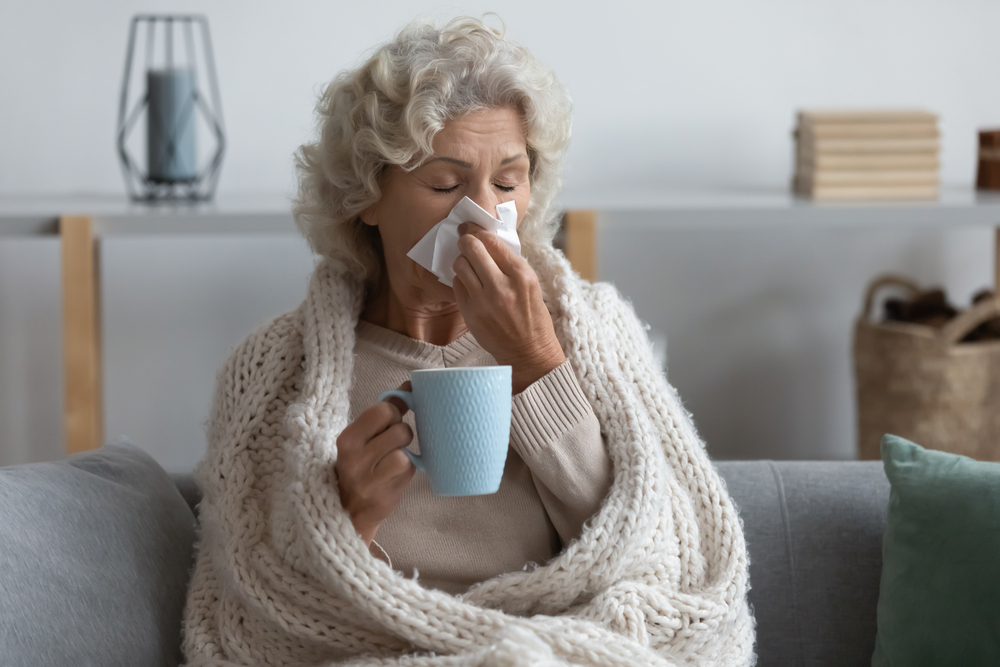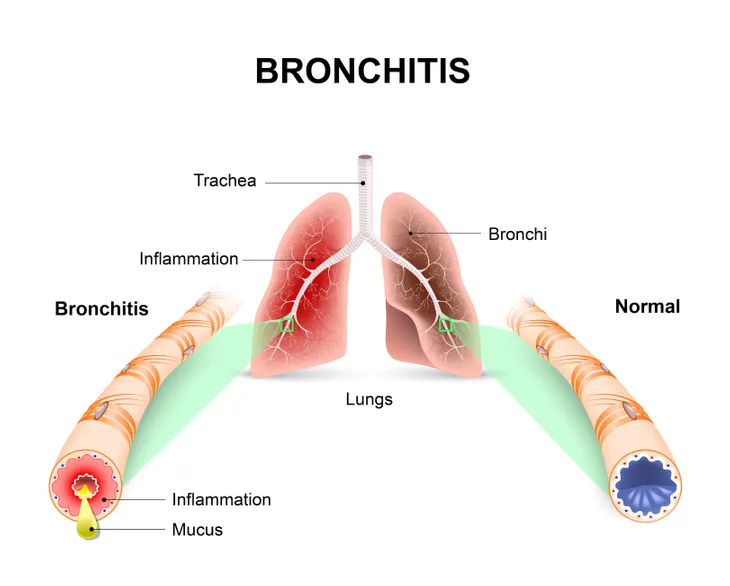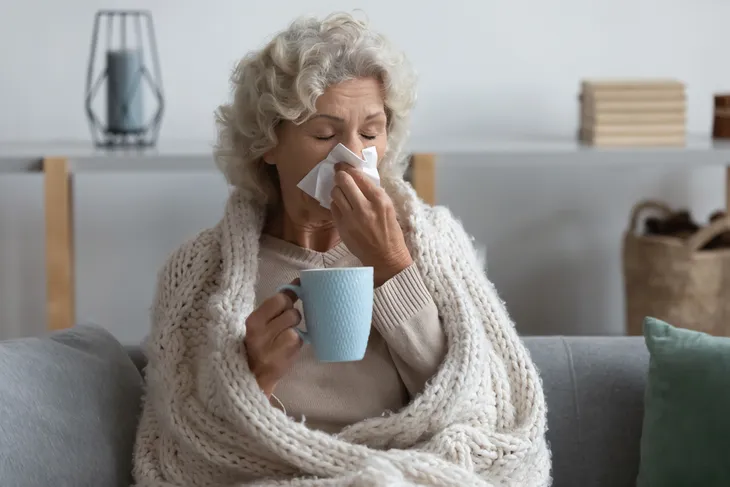The flu (influenza) is a contagious respiratory illness that can cause mild to severe symptoms. It can infect the nose, throat, and in some cases, the lungs too. Many people can recover from the flu in about a week but it can also have life-threatening complications for others. Healthline explains, “The risk of complications increases if you’re over the age of 65.” This is why learning about the symptoms, causes, and treatment is so important.
Seniors have a greater risk of developing complications because as we age, our immune system naturally weakens. This can make it harder for our bodies to fight off a virus. That said, recognizing the risk factors for the flu and taking preventative measures will help set you up for success when the flu season starts. Here is what seniors should know about the flu.
Common Flu Symptoms
Flu symptoms can start just one to four days after exposure to the virus. While flu symptoms can be similar to a cold, the common cold is usually much milder and its symptoms typically come more gradually than the flu.
Some common symptoms of the flu include a runny nose, congestion, a sore throat, and coughing. You may also experience fever, body aches, chills, weakness, fatigue, headache, and chest discomfort.
Flu Complications in Seniors
Younger people and those with healthy immune systems don’t experience many flu complications. That said, up to 70-percent of seasonal flu-related hospitalizations occur in people who are 65 years or older. And it can even be life-threatening for some.
Furthermore, some other minor complications of the flu include a sinus infection or an ear infection. However, it can have more serious complications that affect the lungs such as pneumonia and bronchitis. Let’s explore these complications next.
Bronchitis Complications in Seniors
While this doesn’t happen for everyone, bronchitis can develop about three to four days after having the flu. Healthline explains, “Bronchitis occurs when inflammation develops in the lining of the bronchial tubes. These are the tubes that carry air to the lungs.”
Common symptoms of bronchitis include fever, chest pain, coughing up yellow, green, or gray mucus, fatigue, and shortness of breath. Seniors are at a higher risk for complications related to bronchitis because a lifetime of damage to the lungs can lead to even more severe infections.
Pneumonia Complications in Seniors
Unfortunately, another complication seniors need to be mindful of is that bronchitis can lead to pneumonia. Pneumonia can occur when the tissue of one or both lungs becomes inflamed. It can cause a severe cough, shortness of breath, and chest pain.
Seniors may also experience confusion, nausea, and vomiting, as well as lower than normal body temperature. Pneumonia can be dangerous for seniors. Healthline explains, “If left untreated, bacteria can get into the bloodstream and cause organ failure. This lung infection can lead to fluid accumulation in the lungs or a lung abscess.” Make sure you don’t ignore severe symptoms of the flu and see your doctor immediately if you’re experiencing any of these symptoms.
Flu Prevention Tips
The best way to avoid the flu and the complications that can come with it is to take preventative measures. For starters, you’ll want to avoid touching your face, mouth, and nose with your hands (especially when out in public). You should also regularly disinfect the surfaces in your home and pay extra attention to surfaces that are touched often like doorknobs and light switches.
Furthermore, you can be preventative by boosting your immune system. This can be done by eating a healthy diet, getting plenty of rest, reducing stress, and exercising regularly. Finally, you should also wash your hands regularly and consider getting the flu vaccine.
Should Seniors Get the Flu Vaccine?
Another preventative measure you can take is getting an annual flu shot. While the flu vaccine isn’t 100-percent effective it can reduce your risk of getting the flu by 30 to 60-percent.
It’s worth noting there are different types of flu shots and some are designed for specific age groups. For example, the high-dose flu vaccine, Fluzone, might be a good option for seniors as it helps build a stronger immune system after the vaccination. Make sure you discuss your options with your doctor to find the best vaccine for you.
Are you up to date on all your vaccines? Check out these vaccines seniors should consider!
The Importance of Washing Your Hands
Practicing good handwashing is important all year round but especially during flu season. The flu spreads mostly by droplets when a person coughs, sneezes, or talks. It can transfer to others up to about 6-feet away.
Further, You can also get the virus by touching a surface or object that has the flu virus on it followed by touching your nose, mouth, or eyes. While catching the flu this way is less common, it’s still a good reason to wash your hands regularly.
Some key tips for washing your hands effectively include lathering your hands with soap and water for at least 20 seconds. Then, make sure you rinse well and dry your hands using a clean towel, paper towel, or air dryer. Good handwashing will go a long way in protecting you from the virus.
When is Flu Season?
Did you know the influenza virus circulates all year-round? But according to the Centers for Disease Control and Prevention (CDC), “…most of the time flu activity peaks between December and February, but activity can last as late as May.”
With this in mind, it might be best to get the flu shot before the end of October. This is because the vaccine can take about two weeks for it to be effective.
Flu Treatment Options
If you do catch the flu, antiviral drugs may be a good treatment option. According to the CDC, not only can antiviral drugs lessen your symptoms but they may also be able to shorten the length of time you are sick by a couple of days. Make sure you speak to your doctor to find out if antiviral drugs are a good option for you.
Furthermore, there are also home remedies you can try to ease the flu symptoms. Some of these include getting plenty of rest, using a saltwater rinse, taking a hot shower, and drinking plenty of liquids. There are also some foods you should eat when fighting the flu such as chicken soup, ginger, garlic, and vegetable juices.
When to See a Doctor
Battling the flu is never fun, but for most healthy people the illness will go away on its own in about seven to 10 days. That said certain symptoms require immediate medical attention.
Make sure you call your doctor right away if you are having trouble breathing or if your symptoms don’t improve or if they get worse after three to four days. Further, if your flu symptoms improve but you suddenly develop nausea, vomiting, high fever, chest pain, or coughing with thick mucus, you should also call your doctor immediately. These could be signs of a more serious problem.













